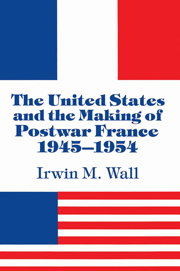Book contents
- Frontmatter
- Contents
- Acknowledgments
- List of abbreviations
- Introduction
- 1 The diplomatic heritage
- 2 The postwar years: Independence compromised
- 3 L'année terrible
- 4 Americanizing the French
- 5 Building an alliance
- 6 The Marshall Plan
- 7 Military aid and French independence
- 8 The United States and French Indochina
- 9 France declares its independence
- Conclusion
- Bibliography
- Index
5 - Building an alliance
Published online by Cambridge University Press: 04 December 2009
- Frontmatter
- Contents
- Acknowledgments
- List of abbreviations
- Introduction
- 1 The diplomatic heritage
- 2 The postwar years: Independence compromised
- 3 L'année terrible
- 4 Americanizing the French
- 5 Building an alliance
- 6 The Marshall Plan
- 7 Military aid and French independence
- 8 The United States and French Indochina
- 9 France declares its independence
- Conclusion
- Bibliography
- Index
Summary
NATO, ANTICOMMUNISM, AND FRENCH STABILITY
American-Frenchrelations from 1948 through 1950 involved three distinct aspects: a conventional diplomatic relationship, an American role in directing and planning the growth of the French economy, and activity by U.S. government and private agencies on the internal French political scene. All of these were integrally related. From the diplomatic standpoint, the major development was the construction of the North Atlantic Alliance. The traditional historiographical view of NATO interpreted it as a response to a perceived military threat to the West by superior Soviet forces. Revisionist historians took the opposite tack, stressing an alleged American offensive designed at once to consolidate Washington's sphere of influence in the west and pursue an aggressive policy designed to loosen the Soviet grip on its area of hegemony in the East. Gabriel Kolko argues that NATO responded at once to an economic recession in the United States and Europe, which necessitated a military buildup to alleviate the pressure, and an American desire to stabilize its European allies while the ECA forced them to adopt conservative and deflationary economic policies that restricted consumption. Having discovered that the United States did not perceive a real danger of Soviet military aggression during the construction of the alliance, historians have cast about for other American motives. Melvyn Leffler stresses a general postwar Pentagon strategic plan to keep any unfriendly power from dominating the Eurasian land mass, and the desire to bolster the internal politics of the nations of Europe against internal subversion.
- Type
- Chapter
- Information
- The United States and the Making of Postwar France, 1945–1954 , pp. 127 - 157Publisher: Cambridge University PressPrint publication year: 1991

